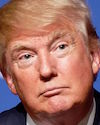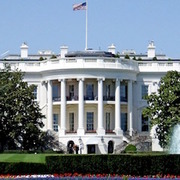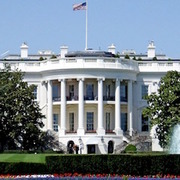tv
 Trump Administration
Trump Administration
Archive
Bloomberg Markets The Trump Economy Bloomberg May 1, 2017 1:15pm-1:26pm EDT
Archive
1:15 pm
it is buzzing in beverly hills with a familiar face the many at a conference, wilbur ross. secretary of commerce. good to be with you. as weof familiar faces, said. there was an interview with president trump and north korea, his willingness to meet with the president there. secretary mnuchin said that north korea was the biggest issue for him as well. how does that figure into what you are doing on trade? well, north korea is obviously not much of a trading partner for anyone. it has no direct impact. the president is hoping to get help. as a result of the strategic economic love, we started at mar-a-lago. they have been dealing with the chinese on trade with financial
1:16 pm
issues at the same time. secretary tillerson in the president have been dealing with that on north korea. jason: how much do you worry tot the geopolitical issues slow down the progress with the chinese directly and throughout asia. wilbur: the chinese know that we need to change some things in the relationship. as did the others in southeast asia. china is one of the most protectionist countries in the world. those cannot continue to coexist. are you planning on going to the trade ministers meeting? i rememberhanoi, if
1:17 pm
correctly. sometimes at the end of the month. aipac is a fine group. i met with their ministers in washington a week ago. those sessions are not really negotiated. it's broad brushes. our country will leave well -- will be well represented. china,looking beyond what are the key issues for you as you think about asia, a place you spend a lot of time as an investor. what are the things that need to happen beyond china to get trade going between the u.s. and those key countries? wilbur: sure. they are -- markets in asia for us are china and japan. vice president pence and i began a strategic dialogue with japan when we were over about a week and a half ago. think we will make some
1:18 pm
progress on that score. those have to be corrected. to homeoming closer here, give us an update on where you are thinking about nafta, how you are thinking about nafta right now. wilbur: well, it really hasn't changed from before. it's an old agreement, obsolete doesn't reflect the current status of the mexican economy or the american, or the canadian. second, it has a particular origin. mainly how much abrupt material can be brought in from outside nafta. automotive, for example, they did it part by part in some of those on even used anymore. has changed.
1:19 pm
there are a lot of changes like that, a lot of things that weren't even thought about. digital economies that really dealt with the service economy, not really dealt with very much. some of the liberalization in mexico has to deal with natural resource laws. so, there's a whole lot of stuff to do. day thend of the objective will be to hold. increase total trade and reduce with bothdeficit mexico and, to a lesser degree, canada. this: help us understand timeline. the president spoke to the leaders of both countries last week, but what do we do next? wilbur: what we are waiting on is the contrast -- congress to authorize the tpa, the so-called fast turn. what is required there is permission for tomorrow -- two
1:20 pm
more consultations and the acceptance of a formal, very stylized letter, sitting out -- setting out the negotiation objectives. that's the key ingredient. really the only reason negotiations haven't begun. mexico is ready, canada is ready. the u.s. congress has been holding it back. how -- jason: how soon do you think they will act there? wilbur: we think it will be pretty soon. reported out of committee last week, there is no real reason he couldn't be voted on very quickly. , think that is just an excuse he could get confirmed very quickly and that should take care of that. meon: there was talk last that's last week about ditching nafta altogether.
1:21 pm
what about the possibility of really just getting rid of the whole thing right now? what's unfortunate is that some of the leaks change what had begun as assessable -- sensible discussion of alternatives into something else. it's very bad, all the leaks, but they seem to be a fact of life in washington. told me that there is no such thing as an off the record conversation. but the fact remains that the president has made the decision to try to negotiate nafta all over again. he has also made it clear that if we can't do that, his inclination would be to withdraw. one of the things that investors seem to be especially interested in, it seems, is infrastructure and manufacturing to a large tent. a big tease of that, you have said, are the regulations and regulatory burdens that people feel in moving towards that.
1:22 pm
how much progress are you making towards that effort to get things going in that regard? wilbur: the president has cast of the department of commerce with polling manufacturing industries to find out what permitting rules and regulatory problems concern them the most. they've been analyzing the results that came from that and very shortly be will be submitting our report to the president, with our recommendation on what to do. thee separately, infrastructure sales study team has been working on the ones just peculiar to infrastructure. there is simple. one, the way the rules are enforced. number two, the complexity of the process. , more thanl, federal one dozen federal agencies. often the federal in the state have a slightly different objective.
1:23 pm
it takes a ridiculous amount of time to get a program approved. eight years, 10 years. that's not the way that you do infrastructure. china built 20 brand-new airports last year. we haven't built an airport in 20 years. that's night -- not the right way to be the united states of america. one of the most recent actions coming out of your department was investigation into the aluminum and steel industry around national security. are there other pieces, other sectors that i'm thinking about, semi conductors, other pieces of technology that you may be investigating in the future as a part of that? are looking at all the big sectors. the national security interests are real, they are being threatened. you can argue that the real reason that we won world war ii was american industry, even more than the valiant men and women
1:24 pm
who were fighting. with the army, the navy, and the air force, with low capital expenditures and calculations, obviously the military budget is going up. even in a peacetime environment, let alone if we get into some sort of horrible conflagration. we need to be very mindful of defense interests. while it may sound like a small portion of steel or aluminum, the fact is that there are only two aluminum smelters in this country that are fully operational. only one company in this country qualityes a high aluminum that you need for aerospace applications. similarly, in steel, there are only two that make high quality alloyed steel that you need to reinforce battleships and vehicles used in combat. those are owned by
1:25 pm
foreign companies. there are lots of issues around national defense that have a direct result on what happened to our manufacturing base. mentioned at the top that you are here among a lot of your old friends here in beverly hills. what are you hearing from them? what are they saying about the administration so far? what are they saying that the president and you need to do next? well, a lot of them didn't vote for the president, but they all seem very enthusiastic about the direction in which he is trying to take the country. some of them are very frustrated, as we are, by the slow walking we have been getting. even take my own confirmation. reported out of the committee with an anonymous vote and i and it up hitting 72 votes in the senate. obviously was not controversial, but it was delayed two months. for ustwo months longer
51 Views
IN COLLECTIONS
Bloomberg TV Television Archive
Television Archive  Trump Administration
Trump Administration  Television Archive News Search Service
Television Archive News Search Service  Executive Branch Archive
Executive Branch Archive 
Uploaded by TV Archive on

 Live Music Archive
Live Music Archive Librivox Free Audio
Librivox Free Audio Metropolitan Museum
Metropolitan Museum Cleveland Museum of Art
Cleveland Museum of Art Internet Arcade
Internet Arcade Console Living Room
Console Living Room Books to Borrow
Books to Borrow Open Library
Open Library TV News
TV News Understanding 9/11
Understanding 9/11










